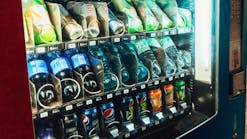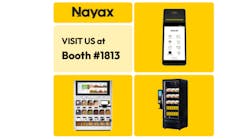Aramark Collegiate Hospitality data reveals student dining and hospitality trends
Each fall, Aramark Collegiate Hospitality surveys students to reveal what they are looking for in their dining and hospitality experience on campus. Nearly 70,000 students – close to 70% of whom live on campus – responded to the Aramark Collegiate Hospitality National DiningStyles call for feedback. The 2023 data shows interesting and exciting shifts in what students look for, revealing a desire that aligns more with students of 20 years ago than a mere five years ago. Additionally, the survey found that holistic health and wellness are top of mind for students.
The findings show that students do still align with their immediate past peers in that connectivity is paramount to their experience; they want to feel relaxed and welcome in their dining environment. They also, however, are looking for practicality and routine, a parallel to current nostalgia trends where association with simplicity resonates with a generation looking to the early 2000s as a time with less social stress and pressure.
“In order to build a deep partnership with a campus, we need to understand what students connect with emotionally, what associations of comfort, home, and security are linked with their hospitality experience,” Jack Donovan, president and CEO of Aramark Collegiate Hospitality, said in the announcement. “We prioritize constant feedback to do this—from on-demand Voice of Consumer surveys that students always have access to so we know the micro pulse on campus to the periodic and massive industry student polls that we undertake over the course of the year. We also garner additional insights from our discussions with our national Council of Student Advisors, our HBCU Emerging Leaders, and other student audience groups.”
The data also revealed shared focus areas for students across the United States. Students look to wellness practices like mindful eating and allergen and dietary choices as priorities for their campuses. This aligns with Collegiate Hospitality’s effort to make sure that campuses have accessible nutritional guidance – every student across the Aramark space has access to a registered dietitian to learn about healthy eating and allergen solutions. Students are also concerned with sustainable food efforts to meet environmental and social goals, a partnership that is welcomed by Collegiate Hospitality.
Wellness and mindful eating
More than a third of students related mental wellbeing to mindful eating. Students look to protein, fresh fruits and vegetables, and fresh made-to-order foods as their top desires on campus.
To meet this desire, Aramark Collegiate Hospitality conducts events around the program “Take 15,” a concept that encourages students to Take 15 minutes away from their screens to participate in mindful eating, activity/exercise, or rest/relaxation. At a college in New England, Aramark provides a Take 15 area in the residential restaurant where students can relax and socialize or participate in interactive events that highlight National Stress Awareness Month in April with the campus dietitian, or they can spin a wheel to win a relaxation-promoting prize.
Additionally, Eat to Excel, designed by Aramark chefs and dietitians, is a dietary performance program designed for all student athletes to achieve their wellness and personal goals. The program gives students access to balanced nutrition information through menus and an app to track and support peak performance. Student-athletes use the “build a plate” feature during the course of their training season to plan their meals to meet nutritive needs.
Allergen and dietary choices
Thirty-six percent of the National DiningStyles survey respondents disclosed that they had food allergies or dietary requirements. Ingredient and nutrition information as a range of options for special diets led to top performance satisfaction.
Collegiate Hospitality works with an external partner – MenuTrinfo, a nutritional food allergy consulting company – to ensure that students and parents are assured a safe dining experience. There are currently 123 AllerCheck certified locations, the most stringent qualification from its partner. AllerCheck is the first-of-its-kind audit for allergen-friendly dining stations; each location must be audited and certified once per semester. Additionally, all managers across all accounts are encouraged to take AllerTrain training.
Another step that Aramark Collegiate Hospitality has taken to meet student needs is forming a Health and Wellness Council to ensure that it is responding to the things that matter most to students including food and safety communications and programming and education. This council includes field-based registered dietitians, culinarians, and safety experts who meet monthly to develop educational programming and fun, informative campus events to support student wellness needs based on field experience and industry expertise.
Sustainability efforts
Reducing food waste, donation of surplus food, and recycling/composting were the top three concerns for students with regards to their campus dining sustainability efforts.
Aramark Collegiate Hospitality drives waste minimization by focusing on reducing, reusing, and recycling food and other waste. The approach is aligned to the Environmental Protection Agency (EPA) Wasted Food Scale (formerly known as the food recovery hierarchy). Aramark also works to continuously minimize its footprint through waste reduction efforts, such as front and back of house compositing, ingredient upcycling, and hosting waste awareness events. Reducing waste is a core commitment for Aramark and as a “Food Loss and Waste 2030 Champion," Collegiate Hospitality, along with the enterprise, is committed to reducing waste by 50% by 2030.
Fighting food insecurity is a key part of the partnership that Collegiate Hospitality brings to campus, and effort that has donated more than 730,000 pounds of surplus food and more than 60,000 meals swipes, as well as supporting more than 72 on-campus and community gardens.
Additionally, Aramark Collegiate Hospitality is partnering with an enterprise food service technology company with a mission to prove that sustainability can drive positive environmental and economic benefits for businesses. The impact is mighty: University of Delaware using this technology alone will divert more than 40,000 containers from landfill in partnership with their campuses (in addition to the more than 38,000 pounds of food waste on campus that is composted!).









